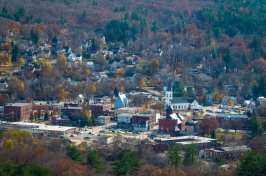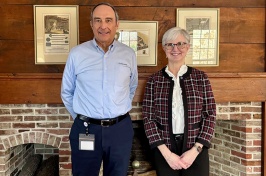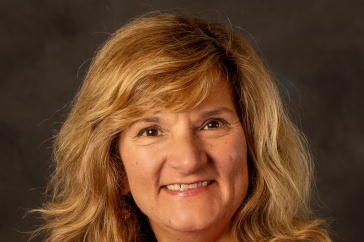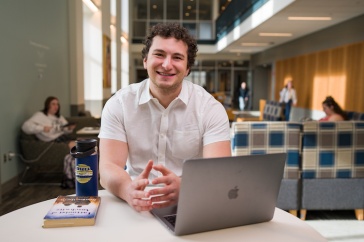
Students in BSCI 620 - Global Science Explorations spent spring break studying different ecosystems in Belize. We'll be posting these students' stories over the next few weeks, so keep checking back for more insight into their Central American adventure!
Without a doubt, Belize is one of the most beautiful countries I have ever visited. This trip was a great experience that allowed me to learn about a different culture and even about myself. Going abroad during winter was a good idea because I got to appreciate the warm temperatures in Belize. I enjoyed every moment of this trip and tried to make every second count. Some of the things Belize offered me were exquisite food, amazing views of its majestic lands, the option to study its biodiversity, the privilege to interact with very kind people and the opportunity to learn about the Belizean culture.
I tried typical dishes from Belize, and I liked them a lot. Beans, rice, oranges and pineapple were some of my favorite foods. I loved the fact that most of the food was organic and harvested by nearby farmers. I also loved how cordial and respectful Belizeans are. I was welcomed everywhere I went — people were extremely receptive and eager to have our whole group around. Furthermore, Belizeans were very innovative and resourceful. We had the privilege to witness and learn how to make chocolate from the very beginning (pod from cacao tree) by a very smart Mayan businessman. I was very impressed seeing how the little waste produced can be reused in new products such as wine and vinegar.
Even though Belize is a relatively small country, it’s a melting pot of culture thanks to its rich history. According to Belizean people, even within the various indigenous groups there is variety of customs and beliefs, but they all share making chocolate as a common practice, which in my view is just fascinating. A lot of the cultural indoctrination has to do with the location within the country. For instance, the south of Belize shares more cultural similarities with Guatemala because they are so close. This is reflected by more Spanish-speaking people in this region and even more dietary customs similar to those in Guatemala. Those living in Belize City normally share more common ground with what used to be British colonies, which means most of the city residents do not speak Spanish or language(s) different than the one spoken at home.
Students in BSCI 620 - Global Science Explorations spent spring break studying different ecosystems in Belize. We'll be posting these students' stories over the next few weeks, so keep checking back for more insight into their Central American adventure!
Without a doubt, Belize is one of the most beautiful countries I have ever visited. This trip was a great experience that allowed me to learn about a different culture and even about myself. Going abroad during winter was a good idea because I got to appreciate the warm temperatures in Belize. I enjoyed every moment of this trip and tried to make every second count. Some of the things Belize offered me were exquisite food, amazing views of its majestic lands, the option to study its biodiversity, the privilege to interact with very kind people and the opportunity to learn about the Belizean culture.
I tried typical dishes from Belize, and I liked them a lot. Beans, rice, oranges and pineapple were some of my favorite foods. I loved the fact that most of the food was organic and harvested by nearby farmers. I also loved how cordial and respectful Belizeans are. I was welcomed everywhere I went — people were extremely receptive and eager to have our whole group around. Furthermore, Belizeans were very innovative and resourceful. We had the privilege to witness and learn how to make chocolate from the very beginning (pod from cacao tree) by a very smart Mayan businessman. I was very impressed seeing how the little waste produced can be reused in new products such as wine and vinegar.
Even though Belize is a relatively small country, it’s a melting pot of culture thanks to its rich history. According to Belizean people, even within the various indigenous groups there is variety of customs and beliefs, but they all share making chocolate as a common practice, which in my view is just fascinating. A lot of the cultural indoctrination has to do with the location within the country. For instance, the south of Belize shares more cultural similarities with Guatemala because they are so close. This is reflected by more Spanish-speaking people in this region and even more dietary customs similar to those in Guatemala. Those living in Belize City normally share more common ground with what used to be British colonies, which means most of the city residents do not speak Spanish or language(s) different than the one spoken at home.

We observed several dozen birds and other species of animals. Many of the observed species were new to me — some were very colorful, with unique behaviors and different sizes. I still remember how amazed I was when I observed the red-lored parrot and the magnificent bill of the toucan for first time. In addition there were mammals like the black howler monkey that were nearby, because I could hear their growling sounds.
My group conducted a research in Punta Gorda which is located in the southern part of Belize. We stayed at the Cotton Tree Lodge, a place literally located in the middle of the jungle. This hotel was very unique in its design and services, things like satellite internet, different types of food and luxurious cabanas made Punta Gorda a comfy home for all. Our research consisted of learning about the various qualities of plants in the forest and how they can impact your chances to survive. We were able to build shelter by utilizing palms, eat by recognizing potential sources of energy from plants, drink water by identifying roots and plants that provide this precious natural resource and learned to protect against insects and dangerous vegetation. In addition, we learned about plants that can help treat certain medical conditions and even plants that were used by old generations as anesthetics. I was very thankful we had a very smart and knowledgeable guide who knew the region and its plants.
My only advice to those considering to go to Belize is to bring an open mind and enjoy every second of the trip. This trip indeed was unBelizeable, and If I had the chance to do it again, I would not hesitate. Experiences like this can help you learn about what you really like and how amazing this part of the world is. Belize’s official language is English so there is no language barrier that can frustrate and potentially takes good moments away. Belize or not, this was a dream come true!

















































